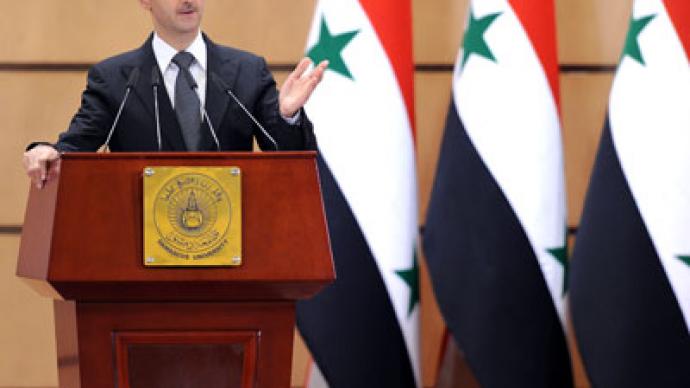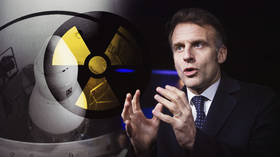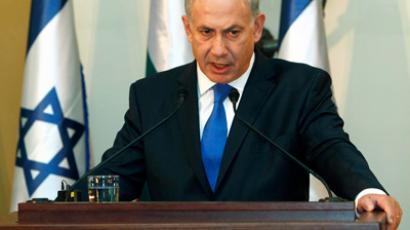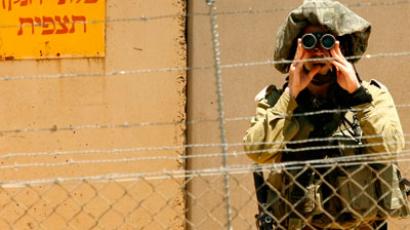Syria's al-Assad being used in ‘great geopolitical game’ - Lavrov

The process of transforming the geopolitical map of the Middle East is under way, and various outside players are seeking to secure their geopolitical footing, argues Russia’s Foreign Minister.
The opponents of Syrian President Bashar al-Assad – both inside Syria and out – are attempting to turn him into a bogeyman, but this is just part of a "great geopolitical game," Foreign Minister Sergey Lavrov said in an interview with Rossiyskaya Gazeta on Tuesday. Many outside forces "have Iran, rather than Syria on their minds," Lavrov noted.Although the minister did not say as much, the comment seemed to be a direct reference to Israel and the United States, two powerful forces in the region that are throwing their hefty support behind the Syrian rebel opposition.Amid the mounting tensions in Syria, the government of Israeli Prime Minister Benjamin Netanyahu has been beating the war drum against Iran, accusing the Islamic Republic of secretly pursuing a nuclear weapons program under the guise of energy research for the civilian sector.However, Israeli and American intelligence on Iran’s nuclear potential remain at variance. In August, a White House National Security Council spokesman said there remains time to “pursue a diplomatic approach” with the Iranian government.This was certainly not the answer Netanyahu was hoping to hear.In September, the Israeli Prime Minister appeared before the UN General Assembly where he held up a crude sketch of a bomb. He drew a red line below the burning fuse, and warned: "It's not a question of whether Iran will get the bomb. The question is at what stage we can stop Iran from getting the bomb.”The push for war on Iran, compounded by real war in Syria, has led some observers to conclude that Israel and the US are fomenting violence in Syria with the aim of toppling the al-Assad regime. Then, in the event of a conflict with Tehran, the US and Israel will not have to contend with a truculent government in Damascus.In light of these developments, Lavrov reiterated Moscow's stance that any changes in Syria should reflect the wishes of the people."The fact that people in the Middle East and North Africa, or in any other part of the world, want to live better and be respected citizens in their own countries is absolutely natural, and we support these aspirations most actively,” he stressed.At the same time, Russia would like to see outside players be guided by the "do no harm" principle, which would enable all political forces to determine for themselves how they want to carry out political reforms, he added.Lavrov stressed that "Bashar al-Assad is the guarantor of security for national minorities, among them Christians, who have been living in Syria for many centuries."The Foreign Minister noted that even Russia’s western partners, who take every opportunity to blame the Syrian President for the problems in the embattled country, admit in confidence that al-Assad still enjoys the support of at least one-third of the population.The reason, according to Lavrov, is simple: Bashar al-Assad is the one individual who can prevent Syria from collapsing into a unrecognizable place where “minorities will simply be unable to live and exist," he said.Lavrov condemned western leaders for failing to abide by the Geneva Communiqué and consolidate the Syrian opposition into a legitimate political group that can sit down at the negotiating table.The Geneva Communiqué is based on a simple consensus that has no alternative: stop the violence, begin negotiations, and agree what the communiqué calls 'a transitional governing body', the composition of which should be approved by consensus between the government and the opposition, he said.The Syrian government supports the conditions of the Geneva Communiqué and that the ball is in the Syrian opposition's court, he noted.The Russian Foreign Minister wrapped up his interview by expressing the hope that Lakhdar Brahimi, the new Joint Special Envoy of the United Nations and the League of Arab States for the Syrian Crisis, will be successful in bringing the two warring sides together for negotiations.He says Brahimi will be in Moscow next weeks for consultations.Robert Bridge, RT














